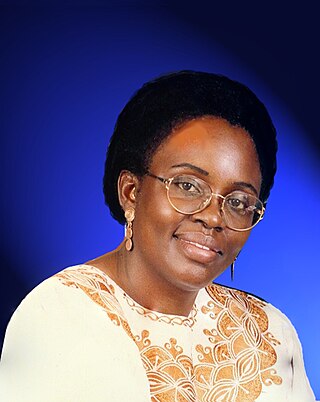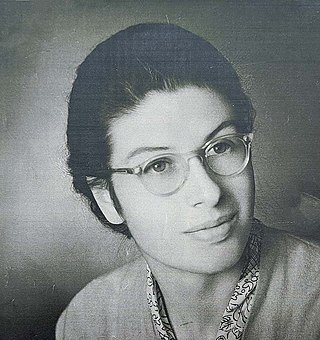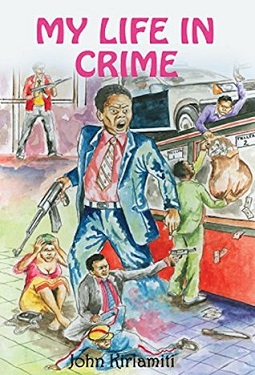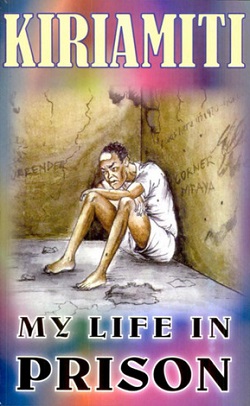
Wangarĩ Muta Maathai was a Kenyan social, environmental, and political activist who founded the Green Belt Movement, an environmental non-governmental organization focused on the planting of trees, environmental conservation, and women's rights. In 2004 she became the first African woman to win the Nobel Peace Prize.

Grace Emily Ogot was a Kenyan author, nurse, journalist, politician and diplomat. Together with Charity Waciuma she was the first Anglophone female Kenyan writer to be published. She was one of the first Kenyan members of parliament and she became an assistant minister.

Margaret Atieno Ogola was a Kenyan novelist who wrote The River and the Source and its sequel, I Swear by Apollo. The River and the Source follows four generations of Kenyan women in a rapidly changing country and society. The book has been on the KCSE syllabus for many years, and it won the 1995 Commonwealth Writers' Prize for best first book, Africa Region. Ogola completed her final book, titled Mandate of the People, before her death and it is set to be released posthumously. She was also the recipient of the Familias Award for Humanitarian Service of the World Congress of Families.
Pio Gama Pinto was a Kenyan journalist, politician and freedom fighter. He was a socialist leader who was key in Kenya's struggle for independence. He was assassinated in 1965, leading many to consider him independent Kenya's first political martyr.
Mnyazi wa Menza, also known as Mekatilili Wa Menza or Mekatilili (1860s-1924) was a Kenyan independence activist who led the Giriama people against the colonial administration of Kenya between 1912 and 1915.

Marjorie Phyllis Oludhe Macgoye was born in Southampton, England, but immigrated to Kenya soon after Kenya became independent. She was a poet, novelist, and a missionary bookseller. She studied at the University of London for both her bachelor and master's degree. In 1954, she moved to Kenya to sell books and, while there, she met Daniel Oludhe Macgoye, a medical doctor, and they were married in 1960. She became a Kenyan citizen in 1964.
Son of Woman is a Postcolonial Kenyan crime fiction novel by Charles Mangua, which was first published in 1971 in Nairobi, Kenya. In a country struggling to reclaim identity, Mangua creates a character that is "returning to a homeland….using an available asset to begin a new career;" a character and story that resonates with the larger population.

My Life in Crime is a 1984 novel by Kenyan author John Kiriamiti. It is a fictionalized account of Kiriamiti's criminality in Kenya during the 1960s and 1970s. The novel details Kiriamiti's crimes under the alias Jack Zollo that led to his imprisonment. It is the first novel in Kiriamiti's My Life... trilogy, which is currently being made into a film.

My Life in Prison (2004) is the third novel in John Kiriamiti's Kenyan crime fiction series, following My Life as a Criminal, and My Life with a Criminal: Milly's Story. This series is loosely based on Kiriamiti's experiences as a young criminal in Nairobi, and was written mainly whilst he was in prison for robbery.
Kenyan crime fiction is a genre of crime fiction that is set in the country of Kenya, and usually written by Kenyan authors. According to G.J. Demko of Dartmouth College, "The fundamental premise of all [crime fiction] is a society that is ordered and real but becomes disordered as a result of a crime imposed on that society. In the normal case, a hero arrives - an officer of the law, a private detective or an amateur sleuth - and via logical deduction, hard work or luck, solves the crime, identifies the perpetrator, and order is restored." However, Kenyan crime fiction differs slightly from Demko's definition because of the following reasons: crime is often so pervasive in societies portrayed in Kenyan crime novels that it becomes almost a part of the order, and many times crimes are not conclusively solved by the end of the stories, mimicking the real-life cyclical nature of crime.

Asenath Bole Odaga was a Kenyan publisher and author of novels, plays, children's books, and other literary works. Odaga also promoted literature in Kenyan languages and the study of oral literature by writing in Luo and co-authoring a guide to oral literature for students.

Professor David Peter Simon Wasawo was a Kenyan zoologist, conservationist, and university administrator. After studying at Uganda's Makerere University he earned an M.A. at the University of Oxford and a PhD at University of London. He taught at Makerere University, and was Professor and Dean of the Faculty of Science at the University of Nairobi, and later chancellor of Great Lakes University of Kisumu.
Jane Alison Kaberuka is a Ugandan writer of fiction and autobiography, and also a senior civil servant.
John Kiriamiti is a Kenyan former bank robber turned writer. Kiriamiti is best known as the writer of My Life in Crime and My Life with a Criminal: Milly's Story, which were both a sensation among Kenyan youth in the late 1980s and 1990s.

Intersex people in Kenya face significant human rights violations, starting from birth. There are few protections from mutilation and non-consensual cosmetic medical interventions and no legislative protection from discrimination. Intersex persons may have difficulties in obtaining birth certificates and others forms of documentation.
The East African Publishing House (EAPH) was a publishing company established in Nairobi in 1965. It was the first indigenous publishing firm in East Africa.
Ainea Ojiambo, is a Kenyan actor. He is best known for the roles in the films The Constant Gardener, Bullion and Jack Zollo: My Life in Crime.
Carolyne Adalla is a Kenyan writer, author of Confessions of an AIDS victim (1993).

Rhodia Mann is a writer, researcher, bead and jewelry designer, and historian of several traditionally-pastoralist tribes in Kenya, including the Samburu and Borana tribes of northern Kenya. She has published six books and is the creator of a documentary, The Butterfly People.
Susan Wakhungu-Githuku is a Kenyan business executive, writer, and publishing house founder, who in her youth was ranked as Kenya's top women's tennis player. She was born in Bungoma in British Kenya and around the age of 11 moved to Nairobi. While attending Loreto Convent Valley Road High School, she began to play tennis. In 1978, she qualified to play in the Junior girls' singles at the Wimbledon Championships. According to the sports journalist Ross McLean, she was the first Kenyan to play in a Junior Grand Slam tournament and until 2022 was the only Kenyan to have qualified for and played in a Junior Grand Slam event at Wimbledon. At the 1978 All-Africa Games she won the gold medal in women's doubles and the silver medal for the women's singles. While studying at St. Lawrence University in Canton, New York, she played in the college circuit. After winning a women's singles title at the World University Games in Mexico City in 1979, she became Kenya's top women's player. She was the 1983 women's champion at the Robbialac Classic Tournament and won the tournament's women's doubles title with her sister Judi Wakhungu the following year. In 1984, she was the winner of the women's matches at the Kenya Closed Championships and in 1987 won the bronze medal in ladies' doubles at the All-Africa Games, before retiring from tennis.










